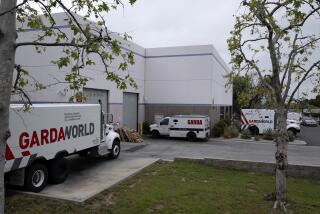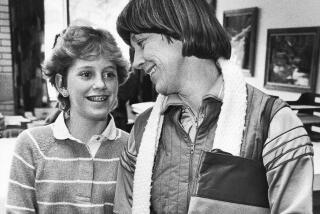Bygone Era Unfolds in Old Billfold
- Share via
Filling a time capsule is like dancing: If you have to think about what to put in it, or where to put your foot next, you can almost guarantee a clumsy result.
That’s why the contents of official time capsules can be so dull. It’s also why looking inside Alma Scott Grieshaber’s wallet is like having 1957 hit you smack between the eyes: a Sears cardboard credit card, a driver’s license made out of paper, trading stamps, a note reminding her to “wear dress or suit and heels,” with the word heels underlined, and a paycheck for a month’s nursing work for $107.37.
One hundred and seven dollars? For a month?
Grieshaber’s wallet was found last week by construction workers remodeling Los Angeles County’s office of public safety in Downey.
Construction crews find stuff all the time: bones when they’re digging, maybe love letters under rugs, or bank bonds in a crawl space. A friend of Matthew Taylor once opened up a ceiling and nearly got hit in the head when a baseball dropped out. The ball turned out to be autographed by Babe Ruth and the demolition man enjoyed a $7,000 payday.
Still, you don’t expect to find anything behind a sink. Taylor and Byron Person were ripping a pair of old sinks out of an upstairs bathroom at the public safety offices last week when a wallet fell to the floor. It had apparently been wedged between the cast iron and the wall a while back. Quite a while back.
The wallet had belonged to Grieshaber and, judging from to its contents, was placed behind the sinks sometime not long after Aug. 22, 1957, the date of the uncashed paycheck. It had presumably been stolen, since it’s hard to imagine any reason Grieshaber might have had to put it there herself.
At the time, the rambling assemblage of county buildings on the campus, the original county poor farm, had been transformed into a medical rehabilitation center. Alma was a nurse, so she might have had reason to be there. But the sinks were in a men’s bathroom, and besides, Alma, according to all information, was a very practical woman, hardly the type to stick a goatskin wallet with a $107 check in it behind a sink for whatever reason.
How the wallet got there might never be known. It’s a story from another time. How it got back to her family is a story very much of this time.
Person and Taylor turned the wallet in to their bosses, who turned it over to county law enforcement. The wallet provided Alma’s name and some photographs, but authorities had no way of finding Alma, who had moved to Oregon in 1989. In fact, by the time Person and Taylor found the wallet last week, she had been dead, of natural causes, for nearly a year.
The county made the name and photographs available to local news media. John Grieshaber, Alma’s grandson, was at work at Boeing’s Huntington Beach plant when he heard his surname mentioned on a TV newscast and caught a glimpse of a photograph on the screen. The young man in the photograph had big ears, a new suit and a bow tie. Grieshaber was certain the man in the picture was his father, Al.
“I thought there can’t be that many people that geeky out there,” he said.
Grieshaber was tied up at work, so he called home. He left a message for his wife, Donna, to call his family to see if anybody knew anything about a lost wallet. Donna was out of the house for the day, so unable to make the calls.
It didn’t matter.
A man who went to high school with Al Grieshaber saw the broadcast and remembered being with Al when the suit in the picture was purchased. He called Al in Oregon, where he now lives.
At the same time, John Grieshaber’s phone message machine was filling up with messages from people he didn’t know who described themselves as Internet genealogists who had happened to see the news item and took it upon themselves to track down the family.
How far is it from a world in which plastic was so rare that credit cards were made of cardboard to one that apparently abounds with World Wide Web detectives?
Alma Sue Grieshaber was the kind of woman who wrote notes to herself: new vocabulary words, grocery lists, wardrobe reminders. Her granddaughter, Cristy Warschaw, said she still finds notes, a year after her grandmother died, in books or dictionaries. Alma was the kind of woman, said her grandson John, who had once driven a herd of cattle across Texas, the sort of woman who, if troubled by squirrels in her garden, would address the problem with a shotgun.
In sum, she was not a woman who was easily amazed. In the matter of the wallet, John Grieshaber said he was certain his grandmother would know exactly what to do: Cash the check.
More to Read
Sign up for Essential California
The most important California stories and recommendations in your inbox every morning.
You may occasionally receive promotional content from the Los Angeles Times.













